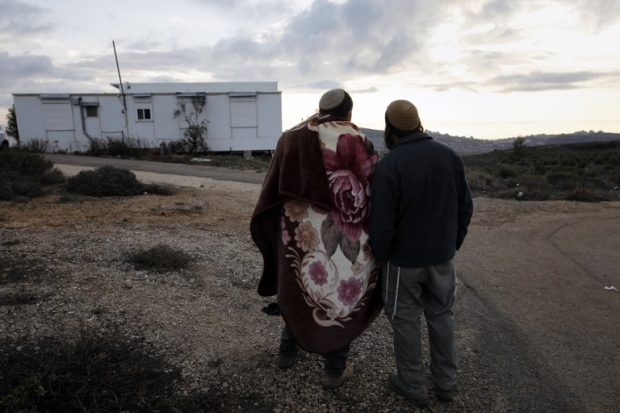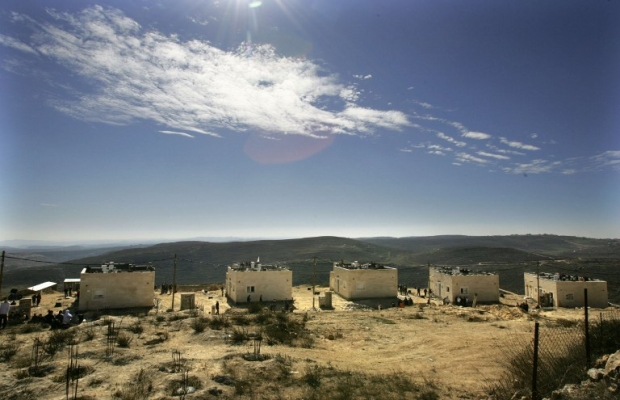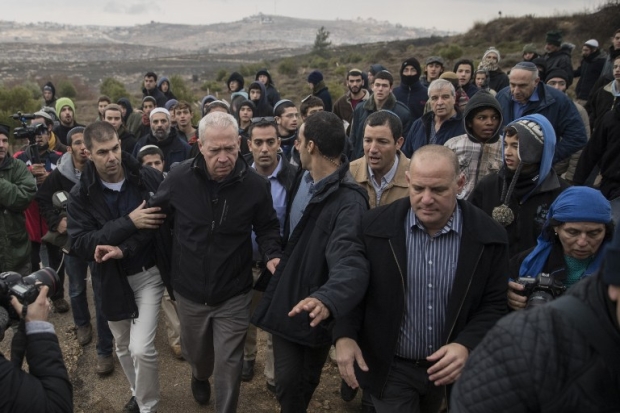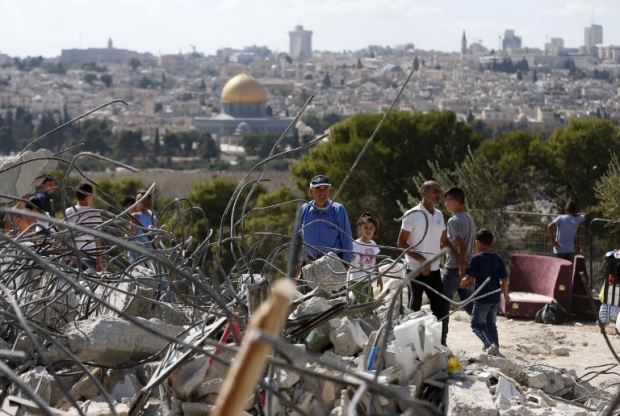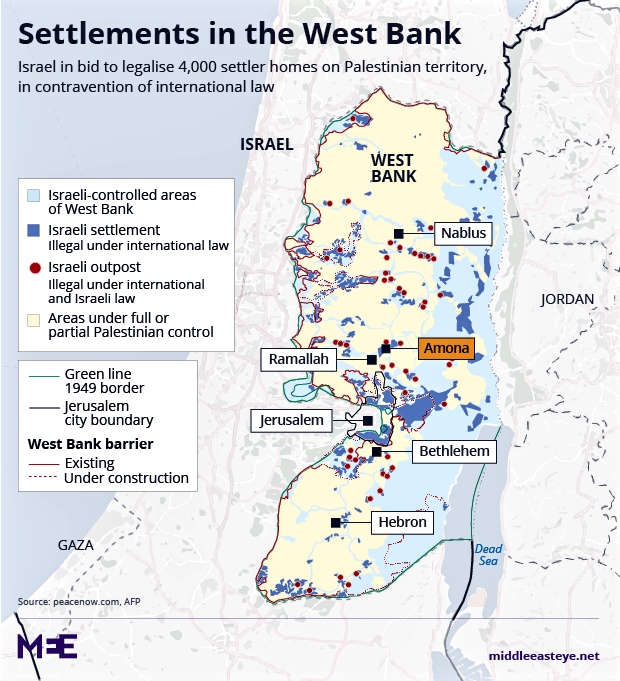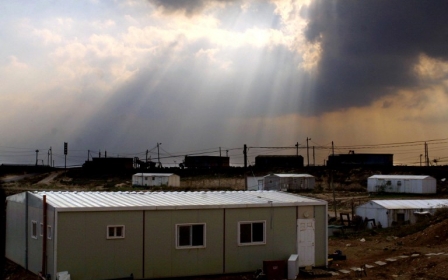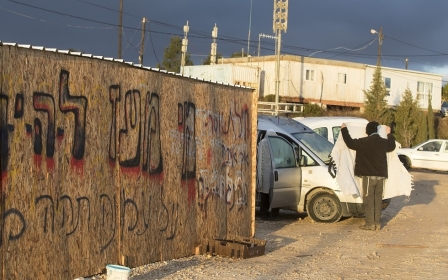How Israeli settlements won their best ever deal from Netanyahu

The settlers have won again. The Israeli government has surrendered again.
Not for the first time, and certainly not for the last time, the strongest political pressure group in Israel, the one that has terrorised Israeli governments for ages now, blackmailing successive administrations and terrifying even the military’s echelons, has once again proved how potent it remains.
Far from waning, its strength grows continually in confrontations with the most nationalist and religious right-wing government in the country’s history, opposed by the feeblest leftist bloc ever, while Israeli public opinion remains totally indifferent.
How Amona was settled - and unsettled
The Amona settlement was created in 1995 as an "archaeological" site, a familiar settler deception. Next to the "archaeological site", a large water tank was put up by Mekorot, Israel’s national water authority. Within a year, three residential trailers were already in place. A decade later, in 2005, 30 families were living there on 400 stolen dunams (100 acres) of private Palestinian land.
The Amona deal will lead to the whitewashing of all illegal settlements built on private Palestinian land, a disaster for generations to come
This, in brief, is the history of many of the settlements in the occupied territories. The Israeli government never approved the establishment of Amona, for which there was never proper planning, no delineation of the area of its jurisdiction and no explicit government decision countenancing any of it.
Yet the Israeli authorities invested countless resources there to pave an access road and to provide electricity and water and other infrastructure, as if Amona had government approval and everything was legal.
MORE: Even Israeli 'moderates' want segregation
In the report on the settlement outposts compiled at the request of then prime minister Ariel Sharon by attorney Talia Sasson, a former senior state prosecutor, still the most comprehensive documentation on the outposts, Amona is listed as an unapproved outpost and therefore illegal. The list includes another approximately 50 such outposts officially designated as illegal.
That, too, is a deceit perpetrated by Israeli governments, as will be explained below. We should bear in mind that all the settlements are equally illegal.
In 2006, following lawsuits by human rights organisations, Israel’s High Court of Justice ordered the demolition of six buildings in Amona built on land that had been proved to be privately owned by Palestinians. The evacuation was violent, pitting thousands of settlers in a physical confrontation with the military and the police. The land, of course, was not returned to its owners, not even when the evacuation and demolition were completed.
During the two years that followed, the government and the settlers found all manner of pretexts for delaying its implementation. For two years nothing was done, until the court recently instructed that next weekend was the final deadline for evacuating Amona.
The government now had a problem: it quickly began promoting a new and amazingly broader "arrangements law" that would whitewash all the settlements built on private land, but Amona would still have to be evacuated to avoid further undermining of the rule of law and the High Court’s authority.
Placate and evacuate
Emotions have been running high during the past few weeks in Israel as the evacuation looms. The settlers are experts at emotional blackmail through the manipulation of the Israeli media which, always attuned to ratings, tends to cooperate; the pending evacuation morphed into a national issue. As the evacuation date approached, the settlers ratcheted up their threats of violent opposition, and hundreds of youth from other settlements thronged Amona, ostensibly to defend it with their bodies.
Netanyahu behaved exactly like the so-called Price Tag extremists who perpetrate vandalism or violence against Palestinians whenever the government tries in any way to restrict their freedom of action
For Bibi Netanyahu, a violent evacuation is a political and media disaster. Thus, it was clear that he would do anything to placate the settlers. They knew it, and exploited it in their usual cynical manner. At a low point during the negotiations, the prime minister announced that he had instructed his minister of internal security to begin demolishing illegally constructed buildings in areas where Arabs live in Israel, as a kind of bribe to appease the settlers.
In so doing, Netanyahu behaved exactly like the so-called Price Tag extremists who perpetrate vandalism or violence against Palestinians whenever the government tries in any way to restrict their freedom of action.
In the context of the prime minister’s already routine incitement against Palestinian citizens of Israel, this promise of demolitions in towns and neighbourhoods where Arabs live might even be carried out, although it wasn’t part of the agreement reached with the Amona settlers. Demolishing Arab homes is popular with Netanyahu’s political base and the opportunity may be too tempting to relinquish.
The settlers naturally reached a last-minute agreement with Netanyahu, who was called to his office in the middle of the night. Under the agreed terms, the settlers will receive substitute land, with more buildings. Above all, every family evacuated will receive a huge sum as compensation.
MORE: The PA should take Israel to the ICC over illegal settlement bill
In a country where the provision of medicines for patients runs to 500 million shekels ($130m) a year, the government decided to distribute no less than 140 million shekels ($36m) as compensation to 40 settler families, who had gone to live in a place they knew from the outset was built on stolen land, land that did not belong to them. They’ve now received substitute buildings on the same mountain where Amona stood.
Needless to say, the Palestinian owners were not given their land back after the evacuation, due to the proximity of the new Amona. Meanwhile, there are also Palestinians claiming ownership of the land at the new location.
Precedent setting
This farce could have been entertaining, if only it weren’t so sad. If it included values like the right to property, equality, proper enforcement, and obedience to international law. If it hadn’t been proved yet again that Israeli settlers can do just as they please because they’re the lords of the land.
Now Israel will declare officially that in the territories it occupies, there is a different law, under which settlers are permitted almost anything, including the theft of land, without hindrance
But the outcome of the Amona agreement won’t end with the outrageous compensation and the no less outrageous establishment of the new Amona. The Amona agreement will lead to a comprehensive policy of whitewashing the outposts and the settlements that were built on private land. Now it’s not just a disaster for Palestinians for generations to come, but also for Israelis.
Now Israel will declare officially that in the territories it occupies there is a different law, under which settlers are permitted almost anything, including the theft of land, without hindrance. In the best case scenarios, the owners who are robbed of their land will be compensated by Israel from state coffers, at the expense of the government’s health budget or welfare budget. Israelis, mostly apathetic, will accept that, too.
It’s hard to believe how the silent majority in Israel this week accepted the Amona compensation agreement, which prompted an immediate reduction in the government’s budgets for social welfare, health and education, and not a word of protest heard.
Artificial distinctions
Most prominent in this picture are the Amona lies. There is no difference whatever between Amona and other settlements in the occupied territories. Branding Amona "an illegal outpost" is how the government and the media whitewash the rest of the settlements as if they, unlike the outposts, were legal. They are not. Not a single one of them.
To distinguish between "state land", where Israel may settle and seize land, and privately owned land, ostensibly a more complicated question, is to make an artificial and manipulative distinction
There is no country in the world that acknowledges the settlements as legitimate and not a single international jurist, apart from propagandists for Israel, which does not view every Israeli settlement as a severe infringement of the Geneva Accords prohibiting settlement of a country’s citizens in territory it militarily occupies.
Likewise, to distinguish between "state land", where Israel may settle and seize land, and privately owned land, ostensibly a more complicated question, is to make an artificial and manipulative distinction. When Israel talks about state land, it means land belonging to the state of Israel. But the state of Israel is not the reigning power in the occupied territories that Israel has not yet had the nerve to annex.
The settlers, whose leadership is even more devious and cynical than the Israeli political norm, based its threatening show of force on the notion that they must threaten Israeli society to the greatest degree possible in response to every anticipated evacuation of a single apartment terrace in a settlement, however small, in order to wipe off the agenda the possibility of a real evacuation at some future time.That’s the Amona balance sheet: the settlers won with a knockout. Israeli society is prostrate before them, indirectly no less plundered than are the Palestinians, the settlers’ direct victims.
- Gideon Levy is a Haaretz columnist and a member of the newspaper's editorial board. Levy joined Haaretz in 1982, and spent four years as the newspaper's deputy editor. He was awarded the 2015 Olof Palme human rights prize and was the recipient of the Euro-Med Journalist Prize for 2008; the Leipzig Freedom Prize in 2001; the Israeli Journalists’ Union Prize in 1997; and The Association of Human Rights in Israel Award for 1996. His new book, The Punishment of Gaza, has just been published by Verso.
The views expressed in this article belong to the author and do not necessarily reflect the editorial policy of Middle East Eye.
Photo: Young Israeli settlers gather in the settlement outpost of Amona, which was established in 1997 and built on private Palestinian land, in the Israeli-occupied West Bank on 18 December 2016 (AFP)
New MEE newsletter: Jerusalem Dispatch
Sign up to get the latest insights and analysis on Israel-Palestine, alongside Turkey Unpacked and other MEE newsletters
Middle East Eye delivers independent and unrivalled coverage and analysis of the Middle East, North Africa and beyond. To learn more about republishing this content and the associated fees, please fill out this form. More about MEE can be found here.



